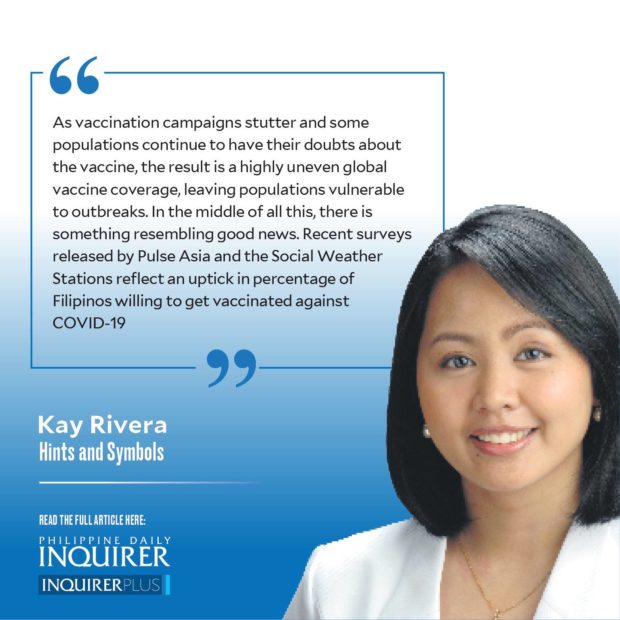A work in progress
The US Centers for Disease Control and Prevention warned last week that COVID-19 is becoming “a pandemic of the unvaccinated.” Across the world, vaccine rollouts continue to be hampered on the one hand by logistical issues, shipment delays and supply shortages, and on the other by persisting issues of vaccine skepticism and hesitancy. Public health experts in the West worry most about young people who have the lowest rates of COVID-19 vaccination and the highest rates of cases. Meanwhile, youth in countries like South Korea are engaged in “click wars,” scrambling to secure leftover vaccine appointments online. At present, as vaccination campaigns stutter and some populations continue to have their doubts about the vaccine, the result is a highly uneven global vaccine coverage, leaving populations vulnerable to outbreaks.
In the middle of all this, there is something resembling good news. Recent surveys released by Pulse Asia and the Social Weather Stations reflect an uptick in percentage of Filipinos willing to get vaccinated against COVID-19.The Pulse Asia survey noted a significant rise between its February and June 2021 surveys. In February 2021, those willing to get vaccinated once COVID-19 vaccines would become available was a mere 16 percent while those who said they would not get vaccinated comprised 61 percent. Those now willing to get vaccinated accounted for 43 percent, and those who refused dropped to 36 percent; the survey also took note of those who had already received at least one dose, accounting for 5 percent. The Social Weather Stations also noted a rise in adults willing to get vaccinated, from 32 to 45 percent (with 36 percent saying they will surely get vaccinated and 9 percent saying they probably will), and 10 percent have already had at least one dose of the vaccine. Meanwhile 24 percent are uncertain and 21 percent are unwilling.
There is thus some hope that campaigns to educate about the pressing need for vaccination, as well as vaccine safety and effectiveness, may have some effect. However, a lack of information, or a lack of confidence in information sources, continues to influence rates of vaccine skepticism. In the Pulse Asia survey, reasons for not getting vaccinated include hesitations about vaccine safety, which was the most prominent reason, followed by doubts about the vaccines’ effectiveness. Some also believe that vaccines are not needed to combat COVID-19, while a minority are concerned that the vaccinations might be costly.
In theory, such misgivings should be easily addressed by easily understood and widely available information, which is the responsibility of government at every level to drive and disseminate. Health professionals and lay people have also spurred their own communities to seek vaccination. However, we continue to be hampered by issues with public trust, as well as issues with media undermining vaccine safety.
Careless headlines blow up concerns on rare side effects in certain populations. For instance, a certain vaccine is now inevitably linked in the public’s mind to blood clot formation, despite risks being rare, and despite efforts to assure the public that the risk of clotting is significantly outweighed by the benefit of protection from COVID-19 disease. Only last week media outlets released sensationalist headlines on how another vaccine is linked to a “rare autoimmune” nerve disorder, despite the risk being rare, especially with a dozen million doses having been administered and the number of affected individuals numbering around a hundred. Associations and risks are easily, and often incorrectly, translated in the public mind to causal relationships, which undermine good vaccine education. Moreover, it must be emphasized that the risks of COVID-19 infection in the unvaccinated are higher, and may be more fatal, than rare side effects; the risks-to-benefits ratio is an important concept often disregarded in such media coverage.
The Pulse Asia data cites that a significant number of respondents will change their minds and become willing to be vaccinated if they see that their acquaintances have been vaccinated and continue to be safe; if their health providers assure them of the safety of vaccines; or if government officials or medical professionals visit to explain about the safety of COVID-19 vaccines. Some also responded that they might change their minds if they see public figures vaccinated. These are opportunities for us to explore, since it seems that positive examples and stories about safe vaccine experiences help Filipinos to decide in favor of vaccination. Our information drives should continue to focus on this direction, while media practitioners should be careful to provide the appropriate contexts, avoid contentious headlines and clickbaits, and avoid undoing the careful work done on vaccine education.





















